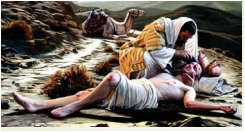
The restless heart murmurs: “If only I knew the will of God. If it were only clear what was wanted of me I would be willing to do it. But things are so complex, and God’s will is difficult to discern.”
Yet Moses said that God’s voice rings loud and bright, signaling our return to him, if only we heed it and give it our allegiance. God’s will is not opaque and distant. If we listen, it sounds within us. “For this command which I enjoin on you today is not too mysterious and remote for you. It is not up in the sky. No, it is something very near to you, already in your mouths and in your hearts; you have only to carry it out.”
There are times when it all seems clear. The heart moves. We know in our bones what must be done. Like the lawyer, we see the law so simply drawn: “you shall love the Lord your God with all your heart, with all your soul, with all your strength, and with all your mind, and your neighbor as yourself.” Ah, but the living of it, that is the problem. “You have only to carry it out,” to will the act, to do it. There’s the rub.
Even after hearing the story of the Good Samaritan, we balk and repeat the question, who, indeed, is our neighbor? Surely not the people in our streets. Surely not the poor of the world. Surely not this particular person here and now before me. And there are many reasons not to stop. I may get sued. Others will come to help. I’m in a hurry. The poor wretch should have planned for disaster. Charity begins at home. How well I know the excuses, myself a teacher and priest. It was such as I who passed the broken man on the road to Jericho. And I would have done the same.
An armless and legless beggar rolling in a Calcutta gutter could not move me to act. I had things to do. He might be part of a racket (what cost he paid for such a ruse!). He will only want more. Others will expect as much from me. My help will only perpetuate his helpless condition. My pittance will do nothing in the long run.
So I, the priest and teacher, passed him by, trying not to notice. It was not the first time. Nor was it the last.
My seeming inability to be a neighbor is hard to reconcile with my professed desire to follow Christ. The will of God still draws close and clear, nudging my heart. And yet I seem at a loss as to the doing of it. The peace I seek is beyond my reach, exceeding both my virtue and my will.
And in those sadly familiar moments when I inspect the abyss between the holy desires God has placed deep in my soul and the sorry fruit of them, I can only turn to the words of Paul, realizing once again that I will never find peace or reconciliation on my own.
It pleased God to make absolute fullness reside in him and by means of him to reconcile everything in his person, everything, I say, both on earth and in the heavens, making peace through the blood of the cross.
Do these words, then, absolve me of the struggle? No. But they do remind me that I will never want to approach the throne of Jesus. I—the lawyer—pleading my case. Let the unrest continue, so that, as journeys to Jericho recur in my life, I realize that the only times I will find my neighbor are when I am generous enough to become one. –
John Kavanaugh, SJ
https://liturgy.slu.edu/15OrdC071022/theword_kavanaugh.html
